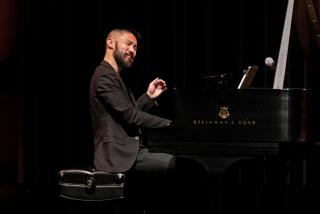A 24-Part Adventure for Left-Handed Piano
- Share via
One of the more eccentric corners of the piano literature accommodates works written for the left hand alone. In some cases, composers have simply liked the challenge of creating a virtuoso exercise for the normally weaker hand that still sounds as if both hands were in play. But the genre became serious when the pianist Paul Wittgenstein commissioned a series of remarkable concertos for piano left hand and orchestra from the likes of Prokofiev, Britten and Ravel, after losing his right arm in World War I. And it has continued to flourish in recent times with the increasing number of pianists who suffer from musculoskeletal conditions like carpal tunnel syndrome.
Still no one, so far, has tried anything quite so ambitious as the pianist and composer Mark Robson did when he opened the third season of Pianospheres Tuesday night in the Neighborhood Church of Pasadena with a series of 24 preludes for the left hand.
Robson’s motivation initially was to produce exercises for a friend who had suffered an arm injury. The project grew into a major series of preludes, one in each of the 12 major and minor keys, that lasts nearly 70 minutes and that was divided between the first and second halves of the program Tuesday.
In the end, Robson probably tried the impossible. It’s hard enough to create 24 interesting small pieces, and every composer who has done that, from Bach up to Frederic Rzewski, has needed every single resource that the piano and 10 fingers have to offer.
Robson succeeded best when he stuck to basics, either simple melody and accompaniment or, at the other extreme, flashy effects. Those elements are the easiest to compose and the most fun to watch in performance. But in his need for variety and desire to pay homage to past composers, Robson also tried all sorts of more compositionally elaborate tricks, and the music very often wound up sounding as if something were missing.
Hamstrung enough, Robson hardly needed the final handicap of working in every major and minor key. Trying not to be too obvious about tonality, he often drifted into a murky kind of impressionism that could begin to seem gloomy after a while.
But it is hard to resist so intrepid a composer and pianist, and one crazy enough to begin (with both hands) a recital with Liszt’s flamboyantly difficult grand fantasy “Reminiscences de ‘Norma.’ ” It overwhelmed the small, beautiful, resonant Craftsman church and, to some extent, the pianist himself. But it was a nice touch, tying in with L.A. Opera, where Bellini’s “Norma” is in repertory and where Robson has his day job.
More to Read
The biggest entertainment stories
Get our big stories about Hollywood, film, television, music, arts, culture and more right in your inbox as soon as they publish.
You may occasionally receive promotional content from the Los Angeles Times.











